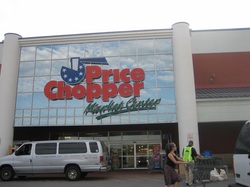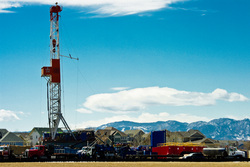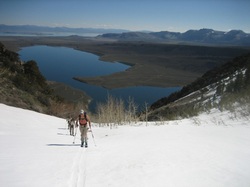|
While on the subject of Supermarkets...it reminds me of something I concluded while reading Michael Pollan's book, Omnivore’s Dilemma. It became evident that supermarket perpetuate a lot of what's wrong in our food system...not eating in season. Yes, there are a lot of things wrong with our food system like corn/soy subsidies, the giant agrichemical corporations, monocultures etc..But supermarkets make us believe that we can have whatever we want whenever we want it. As a result, it fuels a system that requires food traveling long miles so we can have asparagus in the fall and tomatoes in February. We are so accustom to this luxury that we forget that fruits and vegetables are not available all the time. Not only does this occurrence increase a food's carbon footprint but it pushes local suppliers out of the game because they can't compete on price and year-round availability. Supermarkets don't want to work with a gazallion suppliers so they work with just a few and when those few say you can have tomatoes in February, they say, "Sure!" And the cycles continues. Ideally, it would be great if we could get back to more localized, privately-owned grocers who could manage the seasons and work with more local suppliers. So in addition to becoming a farmer, another career opportunity would be opening a market where farmers could sell their goods year round instead of just once a week at the farmer's market.
0 Comments
 When it comes to our country's perception of food, this picture says it all, Price Chooper! A lot of supermarkets are using this approach to attract customers... Save Mart, Save-A-Lot and my personal favorite - Grocery Outlet! Terms like this cheapin food not only in cost but in perception. It creates an imprint so we associate food with finding the best deal versus the best quality. It's not to say, you can't find good deals on food grown sustainably but when you reduce the decision to just price, people forget to think about the story of their food. We should want to know the story of all the things we buy to make sure the materials were sourced consciously and the workers rights are being upheld. But for this discussion, we are talking about food. The stuff we put in our bodies to keep us alive. Come on people! You'll pay over $100 for a pair of Jeans, $50 ever couple months for a haircut, $2.50 for an energy drink, etc... Shouldn't we pay a little bit more for our food to know where it came from? Headed home after an east coast wedding. For this project it is great to visit different parts of America and see other perspectives of our food system. Universally, I've come to two conclusions as to why organic is not more readily accepted as being the right way...1) people think that organic isn't able to feed the world and 2) people want to cheap food. I'll start with #2...and it's pretty simple: Food is NOT cheap. It takes a lot to grow and produce food. Until we understand that concept, will we be able to move forward. But our society has conditioned us to be price driven. Don't get me wrong, I'm on a budget too and need to watch my money just like everyone. But I've decide to shop differently so I can make organic, seasonal and local choices in my food purchases. It means sacrificing some edible desires which our convenience based society has a hard time accepting. But when we waste 40% of our food in this country from surplus, it makes you wonder if we could have affordable, organic food if we stopped dumping most of what this countries grows.And that's just one way.
I'm traveling back East today for a friend's wedding and by far one of the most stressful parts of traveling and moving through airports is finding something to eat that you feel half decent about. I brought my own snacks but when I travel, I get seriously hungry - more so than when I'm active. I eventually need to buy something more. You get that dehydrated, anemic feeling. Guess I should just bring more food...lesson to self. Airports are trying to offer more "healthy" choices these days but a far as how the food is sourced is another question. You know it's not organic and most likely not local. But a vendor that prepares a fresh, mixed salad in theory seems healthier than other options. But is it?? Then you see the overweight kid mackin' on McDonalds and then all of sudden you are overwhelmed by the larger picture...there is a huge elephant in the room that we need to talk about. And a system not only in crisis but one that is so rooted that it makes you wonder if it will ever change. But we have to believe and that's what I hope to figure out and change.
A food awakening is definitely liberating but also overwhelming. All of a sudden you realize all the factors you have to consider...is it local, in season, organic, sustainably harvested, etc... The one question that trumps them all is, "where did it come from." It becomes your baseline. If you know where your food comes from, most of your questions and concerns will be answered. If you like how the food is produced, you will fee good about what you are eating. If the average person stopped to ask where their eggs and meat came from, ten bucks they would start buying organic and free-range.Start asking the "question" and you'll be connected.
My number one site for all green news is www.grist.org. I will reference them a lot during this blogging experiment. Today Barry Estabrook had an article on the impacts of natural gas drilling on agriculture. Movies like Gasland and Split Estate brought attention to the devastating effects of natural gas extraction...flammable tap water and toxic air both resulting in high rates of cancer and respiratory ailments. If it's not in your backyard, it's easy to not think about it but Barry reminds us, that food is our common link..."Fracking" is a process by which a cocktail of water and chemicals are injected into the ground at extreme pressure to release the gas from the bed rock. Not only is it highly water intensive and uses a mixture of proprietary carcinogens that companies don't have to disclose, but the process basically rips the earth below us to get at the gas. Yes, it destroys the ground water for people living nearby but it also infects neighboring crops which rely on those same water sources. Crops whose produce end up on your dinner table! If you want a little more...here is a post I wrote about natural gas for the Center of Native Ecosystems in November 2009. At the time, I had not made the connection to my food but I do now.
I'm a backcountry skier. It's my winter passion and one of my favorite ways to enjoy nature. But to get to the top of the mountain, you have to hike up a long way. Most often you use what's called "skins" which attach to the bottom of your skis and help you climb up the snow. You have a lot of time usually to talk with your ski partners sharing deep thoughts and discussing life's mysteries. I call them the "skin track dialogues." After my last post regarding, "food deserts," I thought I would pose the question..."what can communities with little access to quality food do?" Here are a few more ideas...place special orders with a local general store or create a co-op with friends where you do group food buys. You could take it one step further and buy a whole cow with a group of friends. In spirit of a Tupperware party, have a food swap! Everyone brings enough of what they made for each person attending. For example, if there were 20 people who RSVP'd, I would bring 20 jars of pickled carrots. And someone else would bring 20 jars of preserves, etc...Digging a little deeper in the jar, we came up these ideas...host a cooking class either in a community center or your own house. If your area is affluent enough, you could start a private cheffing business to help people eat better. Either cooking them weekly meals they freeze or catering for a dinner party.
Today I am in the town of Bridgeport, CA. And while you may not think a beautiful town at the base of the Sierra Nevada would be a "food desert," it in many ways is. A food desert is when a community lacks access to good quality, wholesome food. I asked my friend Tina if the general store in town would have goat cheese for our salad and she jut looked at me like, "are you serious?" We take food access for granted in most cities. A food desert usually means there are no markets in close proximity and that only convenient stores and fast food restaurants are available. Residents have to truck long miles to get to get to a decent grocer or food establishment. Typically, food deserts are associated with inner cities and economically deprived neighborhoods but in rural towns like Bridgeport, getting good food is hard to find as well. In Bridgeport, locals are starting to grow their own food but that can be hard for those in urban environments if a community garden is not available. When opening a grocery store isn't probable and 'growing your own' isn't possible, other opportunities exist for both rural and urban communities like starting a farmers market, a CSA program, a community pot-luck dinner or soup night, etc... What are some other ideas for "food desert"?
Today I was reading a news clipping that my Dad sent me from the Wall Street Journal dated, April 9, 2011. It was an interview with James Prokopanko, CEO for fertilizer giant, Mosaic. He kept the conversation pretty topical and definitely knows his stuff. But that's just it, he knows his stuff. His business. How much does some like Mr. Prokopanko spend learning about the other side of growing food. In one statement, he is quoted as saying, "It takes more 'crop nutrients' to produce higher yields." That is the fundamental difference. He sees cultivation as feeding the crops versus feeding the soil. It's not the crops which need the nutrients, it's the soil. If we could get agribusiness to agree upon that, we might be able to make some headway.
Today, I started this website and blog so i will have a forum to collect my thoughts, concepts and inspirations for a new food economy.
|
Archives
June 2013
Categories
All
|



 RSS Feed
RSS Feed
